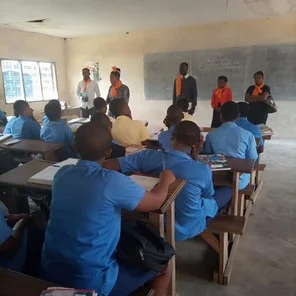School Related Gender Based Violence
IHRC NEWS > What we do 2020 > Africa Region > COVID-19 Cameroon
School Related Gender Based Violence
The issue of school related Gender Based Violence (GBV) is difficult to bring to the forefront. Both girls and boys are victims of violence. As defined in the Declaration on the Elimination of Violence Against Women, a United Nations General Assembly resolution passed in 1993, gender-based violence (GBV) is a term that is not limited to physical or sexual violence, but also indicates equally insidious forms of violence against girls such as economically coerced sex, sexual harassment, demeaning language that undermines self-esteem, and even assigning girls to perform domestic tasks at school while others study (U.N. General Assembly, 1993).



Therefore, GBV is a term that broadly incorporates many behaviors that manifest as physical, sexual, or psychological damage to women or girls.
Given the reported incidences of sexual harassments, rape at Government Bilingual High School (GBHS) Tiko, as well as issues of abuses from teachers in exchange of sex for grades. IHRC team continued to increase awareness with its campaign against school related gender based violence in continuation of the 16 days of activism against GBV in this institution.
The team emphasized to the students that GBV is a human rights violation, it is unacceptable and unjustifiable. Students were extensively sensitized on the various forms of violence including; physical, sexual, psychological, economic and harmful traditional practices.
The ongoing crisis in the two English speaking regions of Cameroon has been accompanied by extremely high levels of both political violence and violent crime. Assault, rape and sexual violence are ‘endemic’ in two English speaking regions of the country. Thus, violence has increased tremendously as well as school-related gender-based violence in schools including GBHS Tiko.
IHRC team drew the attention of the students on the short and long-term consequences of violence in school, for the victims as well as for the perpetrators. They were made to understand that school violence transforms the school environment into one of fear and anxiety which hampers the educational environment and consequently prevents young people from fully benefiting from their educational opportunities. According to UNESCO, 2017; Burton & Leoschut, (2013), school violence can have physical, emotional, psycho-social, and academic repercussions. Low self-esteem, social isolation from peers and depressive symptoms can result from victimization. Depressive symptoms, in turn, may further hamper the learner’s ability to perform academically and to engage in positive social interactions.
IHRC team concluded by stating that a safe environment will be very instrumental for breaking patterns of violent behaviors in schools. Also, a safe school is an underlying force for change. It establishes behavior patterns that reduce gender based violence in wider society
.●National Volunteers Coordinator, Mrs.Holy Anagho
(IHRC SMM,Cameroon)
●MNVC/P.A H.E Bienvenu Goare Hiroua
●ZVC Mr.Ayuk Georges Eliot

